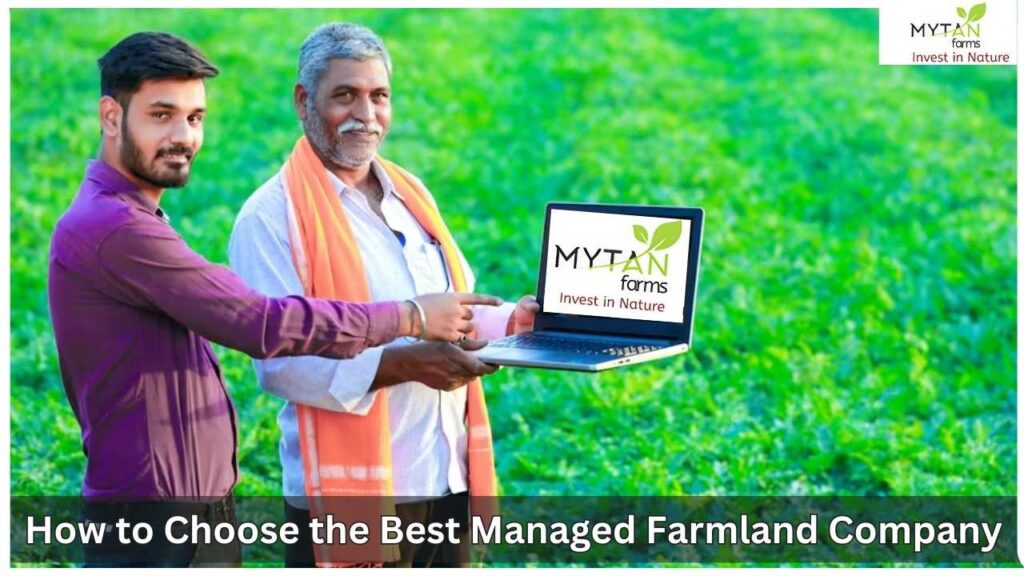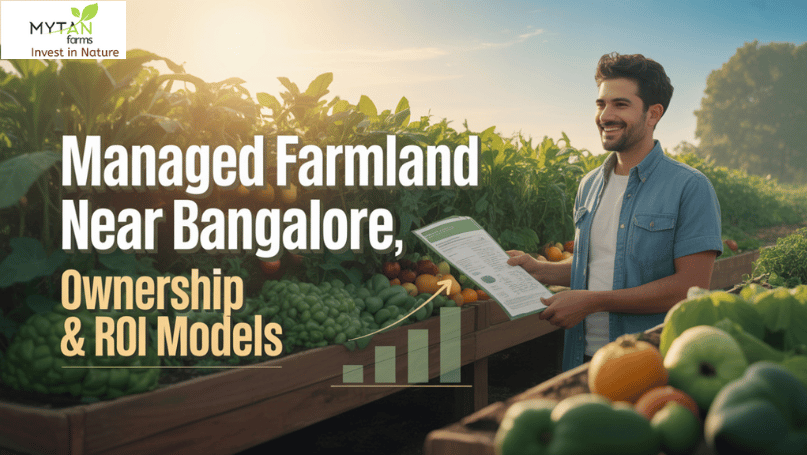
Investments in managed farmland are also increasingly popular among urban investors seeking to diversify their portfolios through tangible investments. Managed farmland allows individuals to invest in the agricultural industry without necessarily having to work on the land personally. Returns are produced through appreciation of the land and also agricultural yields. That said, the right-managed farmland company spells success and profitability in this area.
When choosing the company you will be working with consider a reputable company with experience because a good partner will be more efficient in working on the land, minimize risks, and ensure your investment will give strong returns. In this article, we will discuss the most important considerations of choosing the best managed farmland company with which to entrust your investment.
Experience and Track Record
Years in Operation
The more years that a company has been in the business of managed farmland, the more skilled and reliable it is likely to be. Companies with experience of five years and more working on farmland investments are the way to go. A longer history will be a good indicator of adjusting with changing agriculture and market conditions leading your investment to success over the long term.
Performance History
A managed farmland company with an investigation into their performance history. Companies that have a history of providing returns to investors through the appreciation of land value and crop yields demonstrate the proven ability to manage assets effectively. Also, detailed performance data will be observed with enough year-over-year growth in terms of financial returns and, of course, operational efficiency.
Case Studies or Success Stories
Success stories and case studies can be an idea of the capability of such an organization to manage farmland and generate results. Consider, for instance, some of Mytan Farm’s works:

Mytan Lepakshi
The plot cover area is spread over 15 picturesque acres with 108 units. Belonging to the farmland project near Bangalore International Airport, this one ensures smooth connectivity and proximity to urban centers while it offers peaceful surroundings. It adds an essence to the project with beautiful mountains and a serene lake. Such success before launch at the farm endorses the proficiency of Mytan Farms in setting up high-demand properties.
Mytan Amruta
Mytan Amruta, a 75-acre exclusive project featuring 157 units, is positioned as a premier option for Eco-Friendly Farmland Investment. During its soft launch, 50 units were sold, underscoring the high demand for sustainable, controlled farmland in the region. Located just 90 minutes from Bangalore International Airport, Mytan Amruta offers convenient access to local cultural and historic attractions, making it a prime investment destination. The early success of this project reflects Mytan Farms’ commitment to delivering premium farmland opportunities for eco-conscious investors.
Investment Strategy and Portfolio
Types of Crops and Regions
Diversification is a key aspect of risk mitigation in agriculture, especially for those considering Agro Investment Bangalore. A farmland company should diversify both geographically and in the types of crops they grow. Regional climate challenges or market fluctuations can sometimes cause setbacks, but if your investment is spread across different regions and includes a variety of crops, it ensures greater stability. Companies that grow a diverse range of crops provide better opportunities for consistent returns. Staple crops like grains offer steady output, while high-value crops such as fruits and vegetables add significant investment potential.
Diversification Approach
Farmland investment becomes more secure when it is spread across different geographies and agricultural products. When considering managed farmland for investment, it’s important to analyze how the company approaches diversification and distributes its portfolio. This ensures that no single factor, like weather changes or price volatility, poses significant risks. An ideal managed farmland company would have a diversified portfolio, including multiple crops and locations, to minimize the likelihood of heavy losses due to localized issues, thereby providing a more stable and secure investment.
Risk Management Techniques
Some of the other risks found in agriculture include weather, pests, and market fluctuations. Thus, there is a need to have a strong risk management strategy. Confirm if the company applies crop insurance, hedging of price fluctuation, and advance farming practices to mitigate possible losses.
Transparency and Reporting

Frequency and Depth of Investor Updates
A good farmland management company should report periodically on the progress of how the farm is doing, including financial performance and crop growth. The reports give the investors an understanding as to whether progress is being made or if this investment is profitable.
Access to Farm-Level Data
The company should have managed farmland transparency, allowing you to see real-time data directly at the farm levels regarding crop growth, weather conditions, and even soil health. This sets an ease for transparent decisions in investment.
Third-Party Audits
This proves that independent audits help verify the accuracy of reporting undertaken by the company, which means that investor returns and farm conditions are as stated. Credibility is reached when third-party audits are conducted by companies.
Management Team
Expertise in Agriculture and Finance
Management team plays a prominent role in the successful investment in farm land. The team should comprise experts in both agriculture and finance. Their knowledge ensures efficient farm management and robust financial performance. For instance, Mytan Farms has the leadership from Mr. Harish Babu M L, who himself is a former research scientist with more than 22 years of experience in project management within global pharmaceutical MNCs.
Local Market Knowledge
Sustainable management of farmland depends on efficient knowledge of the local agricultural market. The company must be aware of local conditions such as soil types, availability of water, and regional market demand for specific crops. Local knowledge thus maximizes decision-making processes relating to crop selection and farming practices.
Relationships with Farmers and Industry Partners
Strong ties with local farmers and industry partners will be the ground for which the firm can practice the best to acquire quality inputs such as seeds and fertilizers. It will also facilitate more effective harvesting and distribution of produce.
Sustainability Practices
Environmental Stewardship
Today, the concept of sustainability in agriculture is more recognized than ever. A managed farmland company should observe environmental sustainability practices to preserve the land and increase its long-term productivity. It includes crop rotation, reduced use of pesticides, and organic farming.
Soil Health Management
Soil is the core of agriculture, and fertile soil is essential for the sustainability of farmland. It should preserve the soil through crop rotation and organic fertilizers that ensure soil fertility and prevent soil erosion.
Water Conservation Methods
Water is a valuable resource, particularly in agriculture. A managed farmland organization should utilize effective methods of irrigation and water saving to make it sustainable.
Technology Integration
Use of Precision Agriculture Tools
Precision agriculture technology, for instance, GPS-guided equipment and drones increase farm efficiency. Organizations that keep these technologies in their operations will streamline inputs like seeds, water, and fertilizers, thus increasing yield and cost reduction.
Data Analytics for Decision-Making
Use of data analytics enables the making of conscious decisions in farm management. Based on analysis of weather patterns, soil conditions, and crop health, companies can make changes in real time to improve the performance of the farm.
Innovation in Farming Practices
Farming is an ongoing evolving process; a Company, therefore, needs to think forward in terms of innovations in farming practice, like hydroponics or vertical farming to increase crop yields and lessen environmental damage.
Investor Alignment
Fee Structure
Review the company’s fee structure before making investment. It should align with investor objectives and apply fees that are clear and fair. Be sure to avoid companies that charge overly greedy fees that may be taken from your returns.
Minimum Investment Requirements
Be certain that minimum investment to a company is within your budget. Some managed farmland companies may have high entry thresholds while other companies may offer more access points for smaller investors.
Liquidity Options
Liquidity is an extremely important element in farmland investment. Pay attention to companies that give you options to sell your investment or exit the project if needed.
Regulatory Compliance
Adherence to Relevant Agricultural and Financial Regulations
A well- credible managed farmland company will be complying with all relevant agriculture and finance regulations. This would ensure that the investment has an underlying compliance with the law and protects your funds from any possible liability.
Proper Licensing and Certifications
Confirm that the company has all the necessary licenses and certifications to manage farmland. This will ensure they operate within the limits of the law and apply the best practice.
Client Services and Support
Quality customer service forms the core of a successful investment. Look for companies that guarantee full support to investors beginning with the answering of investor queries, timely updates, and addressing your concerns.
Conclusion
A choice of the best managed farmland company owes to factors such as experience, strategy in investment, transparency, sustainability practices, and involvement of technology. Choosing an experienced company, such as Mytan Farms, and one whose investment goals align with yours guarantees you a good decision that will lead to good returns in agriculture. Farmland is a rewarding investment since one gets financial benefits and the feeling of contributing to sustainable agriculture practices.




